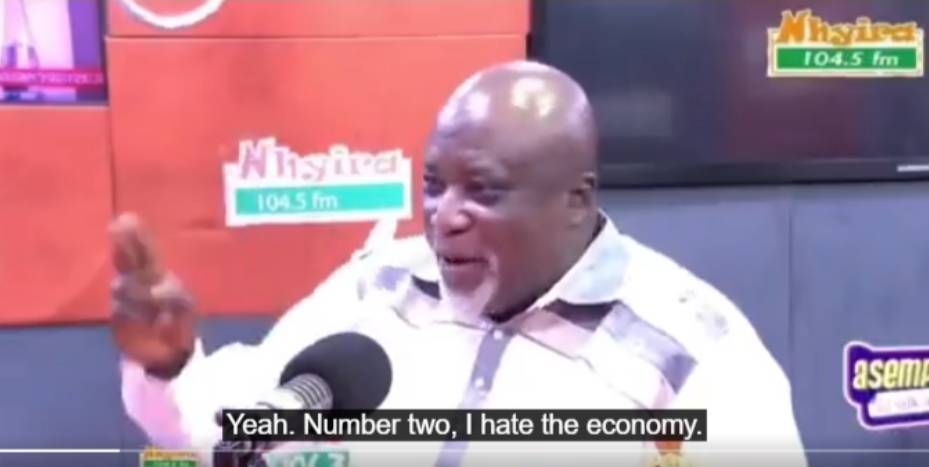Hopeson Adorye, a prominent member of the Movement of Change and Director of Special Duties, has stirred up heated discussions with his recent comments about Dr. Mahamudu Bawumia, the New Patriotic Party’s (NPP) presidential candidate. With just days to the elections, Adorye has boldly claimed that Bawumia is avoiding conversations about the economy, a topic he once confidently dominated.
During an interview on Nhyira FM, Adorye didn’t hold back as he mocked Bawumia’s current approach to economic issues. According to him, the man once celebrated as an economic guru has completely lost his touch. “Number one is the economy, number two is the economy, and number three is the economy. Today, if you invite Bawumia to your studio and mention the word 'economy,' he will disappear,†Adorye asserted with confidence.
The remarks were a direct jab at Bawumia, who previously gained widespread recognition for his lectures and presentations on Ghana's economy. Adorye alleged that those days are long gone, claiming that Bawumia now avoids discussing the economy altogether. Instead, he suggested, Bawumia hides behind the veil of digitalization to divert attention.
The timing of these comments could not be more critical. Ghanaians are set to vote in just four days to choose their next president and members of parliament. For many voters, economic performance is a major deciding factor. Adorye’s critique seems aimed at questioning Bawumia’s competence and credibility on this key issue.
Adorye’s statements included a stinging critique of Bawumia’s silence on economic matters. “The economic lectures he has been giving have all disappeared from his head. Because of that, he is hiding behind what we call digitalization,†Adorye said. According to him, Bawumia is focusing on promoting technological advancements and digitization to distract from his inability to address pressing economic concerns.
For context, Bawumia has been a central figure in the NPP’s economic strategy, often presenting himself as the architect of Ghana’s financial reforms and digital innovations. From mobile money interoperability to digitized government services, he has championed technological progress as a solution to inefficiencies. However, critics like Adorye believe that while digitalization is important, it cannot replace sound economic policies or address the challenges facing ordinary Ghanaians, such as inflation, unemployment, and currency depreciation.
Adorye’s remarks have sparked mixed reactions across the political spectrum. Supporters of the opposition have latched onto his critique as evidence of Bawumia’s alleged failure. On the other hand, NPP loyalists have dismissed Adorye’s comments as politically motivated and unfounded.
For some observers, Adorye’s comments highlight a broader issue within Ghanaian politics: the tendency to reduce complex policy matters to personal attacks. While such statements may grab headlines, they often fail to provide constructive dialogue or offer alternative solutions to the challenges at hand.
As Ghana approaches the polls, voters are expected to weigh various factors in deciding their preferred candidate. For many, the economy remains a top priority. Rising costs of living, fluctuations in the value of the cedi, and youth unemployment are pressing issues that demand attention from any incoming government.
In recent years, Bawumia has built his political brand around his knowledge of economics and his vision for a technologically advanced Ghana. His supporters argue that his initiatives in digitalization have streamlined government processes, improved transparency, and increased accessibility for ordinary citizens. However, detractors like Adorye argue that these achievements do little to address the deeper structural issues in the economy.
The 2024 election is shaping up to be one of the most competitive in Ghana’s history. Both the NPP and the opposition National Democratic Congress (NDC) are pulling out all the stops to secure victory. While the NPP emphasizes progress in infrastructure and technological innovation, the NDC is focusing on the economy and social welfare.
Adorye’s comments are just one example of the intense political rhetoric dominating the campaign trail. As voters prepare to cast their ballots, it remains to be seen whether these critiques will sway public opinion.
One thing is clear: the stakes are high, and the economy is at the center of the debate. Whether or not Bawumia’s focus on digitalization will resonate with voters is a question only the election results can answer. For now, the political arena remains charged with accusations, counterarguments, and promises, as all sides vie for the trust of the Ghanaian people.
As election day draws closer, Ghanaians are urged to critically evaluate the policies and track records of the candidates. The future of the country depends on informed choices and thoughtful consideration of the issues that matter most. While political banter and dramatic statements may dominate headlines, the real focus should be on solutions that will drive economic growth, create jobs, and improve the quality of life for all citizens.
In the end, the power lies in the hands of the voters to decide who they believe can best lead the nation forward. Whether it’s Bawumia, with his vision of a digitalized Ghana, or another candidate with a different approach, the choice will shape the nation’s destiny for the next four years.



No comments yet
Be the first to share your thoughts!